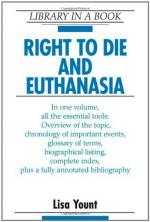|
This section contains 2,365 words (approx. 8 pages at 300 words per page) |

|
Courtney S. Campbell
About the author: Courtney S. Campbell is a professor of philosophy at Oregon State University in Corvallis. Campbell is also the director of the Program for Ethics, Science, and the Environment at the university.
Religious traditions and values can offer guidance to people facing difficult decisions about whether to discontinue medical treatment or request physician-assisted suicide. Major religions usually oppose suicide but exceptions are made. For example, some Western religions hold that the purpose of life is the development of a "religious self"; if the dignity of the individual cannot be preserved, the preservation of life is not seen as an absolute good. Similarly, in the Eastern religions of Hinduism and Buddhism, a patient can shorten his or her life if the act is performed out of compassion for others, such as family members caring...
|
This section contains 2,365 words (approx. 8 pages at 300 words per page) |

|




